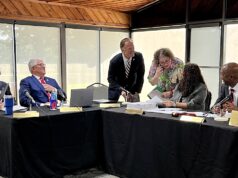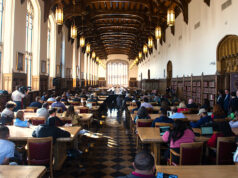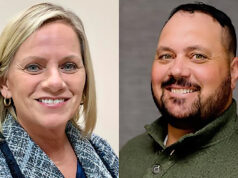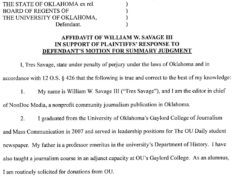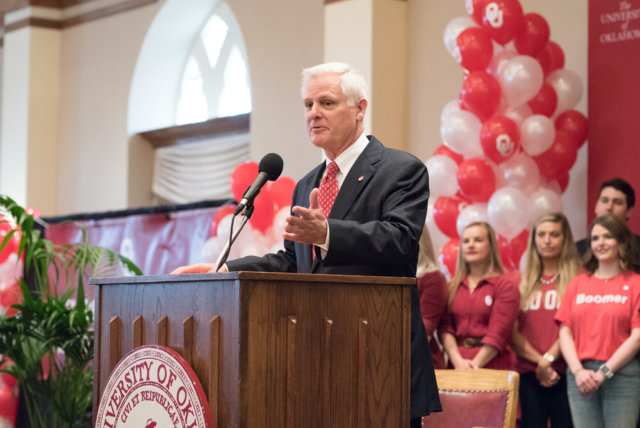
The University of Oklahoma has experienced yet another painful period of national attention, not for a football loss, but for incidents of abject racism. The recent video of an OU sorority member in blackface has captured the attention of major news outlets and was even spoofed on Saturday Night Live. Just days later, a white man in OU gear was spotted on campus walking silently in blackface. The brazenness of the racism caused the university’s president to speak at a forum on race, the day after we celebrated the life of Dr. Martin Luther King Jr.
But we know this is nothing new. Tensions are high on OU’s campus, mostly rooted in racial division. Let us not forget, the video of Sigma Alpha Epsilon fraternity members singing a racist song garnered national headlines in 2015. Days after the SAE video went viral, then-OU President David L. Boren accepted the withdrawal of the students involved and banished the fraternity.
A year and a half later, I was elected Student Government president in the fall of 2016, and I quickly faced lingering racism in our state. An anonymous student posted on social media: “Let’s get a lynch mob together and get this n—–.” Soon thereafter, a group of racist protesters showed up on campus. When Boren challenged them in person and asked them to leave, I remember feeling he was the advocate many marginalized students needed.
Students feel more than ‘anger’
While many current students at OU were upset, sad and hurt by this year’s most recent video, their emotions were exacerbated by the inadequate response from new President Jim Gallogly. His initial comments condemned the actions of the students, which he called “inappropriate and derogatory,” but his reaction downplayed the impact of the video.
Noticeably, the words “racist” and “race” were absent in his statement. The video was racist, and he failed to publicly recognize it. Whether or not this was an unconscious lapse in his judgment, Gallogly’s refusal to condemn the acts outright as racist caused him to lose credibility.
In his latest statement published on the university’s website, Gallogly was clear he intended to move forward. I commend him for his recent efforts to encourage civility, love and respect. However, he reinforced unjust black stereotypes about “anger” and failed to view the students as the recipients of hate, not just agitators demanding justice. Gallogly described the Black Student Association’s Better Together March as “a strong message of anger and frustration.”
As a former OU student who faced numerous acts of racism, I know that a full range of emotions — fear, pain, disappointment — are part of the student experience for many on campus. It is not just about anger. Gallogly, who seems ignorant of this history and reality, does not seem to grasp how painful and damaging blackface has been for generations of black Americans.
As such, the “Rally To Stop Racism” could have been a pivotal opportunity for him to express his ability to empathize and demonstrate his humanity to the key stakeholders. He could have expressed humility toward his critics and admitted fault for his poor responses throughout the first week. Instead, the public rally — at which an OU professor called for his resignation — proved to be another weak spot for Gallogly as he criticized the professor, said he was left speechless and seemingly forgot that concerned, fearful students had called the rally together.
Moving forward, Gallogly should empower marginalized student voices and institutionally cement their role in his decision-making processes. This could lead to transformational change.
We must all do what is right
To reflect on all of this, I quote Dr. King:
Cowardice asks the question, is it safe? Expediency asks the question, is it politic? Vanity asks the question, is it popular? But, conscience asks the question, is it right? And there comes a time when we must take a position that is neither safe, nor politic, nor popular, but one must take it because it is right.
These incidences at OU should serve as important reminders that racism is far from being eradicated in this state. It is time to remove our blinders and reckon with what has been going on for more than a century. Teaching tolerance is no longer enough. Tolerance is passive and does not compel change. Acceptance is active. Acceptance of our reality — of the unity and the racism, the good and bad, the joy and pain — is a means to resolution and greater peace. Actively condemning the violence of racism, sexism, homophobia, etc. are actions that can be seen and emulated.
Diversity and inclusion are the new endeavours ahead of us. Yet, instead of laying aside our differences — or embracing and celebrating the differences of race, gender, sexual identity, religious views, socioeconomic status, disability and other categories — we too often choose to suppress the humanity of others. Our state, its business, political and community leaders have the perfect and oft-forsaken opportunity to take steps forward and do what is right, embracing the positive change we can cultivate together.
Matched with my critique, I have a growing confidence that my alma mater, Oklahoma’s flagship university, is finding its way to becoming a place of healing and growth. Gallogly’s hire of alumnus Dr. David Surratt, who has an extensive professional background, as the dean of students is a refreshing step in the right direction.
Let us hope that cowardice, expediency and vanity are far from the decision-making table and that moral conscience leads the way. OU has the personnel and an active student body that can produce a brighter future for all students. Stay tuned.
(Correction: This post was updated at 4:10 p.m. Wednesday, Feb. 6, 2019, to correct reference to the withdrawal of SAE students from the University of Oklahoma. NonDoc regrets the error.)










